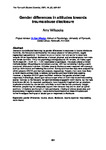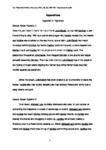Gender differences in attitudes towards trauma/abuse disclosure
| dc.contributor.author | Willcocks, A. | |
| dc.date.accessioned | 2021-12-24T18:30:15Z | |
| dc.date.available | 2021-12-24T18:30:15Z | |
| dc.date.issued | 2021 | |
| dc.identifier.citation |
Willcocks, A. (2021) 'Gender differences in attitudes towards trauma/abuse disclosure', The Plymouth Student Scientist, 14(2), pp. 669-691. | en_US |
| dc.identifier.uri | http://hdl.handle.net/10026.1/18521 | |
| dc.description.abstract |
Research has indicated there may be gender differences in responses to trauma disclosure. Currently, the literature is dominated by the sexual abuse of female survivors, largely neglecting male survivors. The present study compared men and women’s responses towards written hypothetical disclosures of sexual, physical, and emotional abuse from male and female survivors. Thirty-two psychology undergraduates (26 females, six males) aged 18-26 years (M = 19.84, SD = 1.54) volunteered to participate. The study utilised a mixed-methods design; 28 participants completed a survey, with four completing it during a semi-structured, think aloud interview. Attitudes towards disclosure were measured with concepts such as victim blame and believing the survivor. Survey and interview data were analysed by within-subjects ANOVA and thematic analysis, respectively. Notably, men were more likely to victim blame and less likely to believe, sympathise and recommend help-seeking. However, a Bayesian ANOVA gave insufficient evidence that gender affected these responses; interestingly, abuse type had a stronger effect on victim blame and help-seeking scores. Contrary to the literature, female interviewees engaged in victim blame, but the male interviewee did not. As expected, participants more frequently imagined men as attackers. Implications include that women are more likely to victim blame than previously thought. Moreover, people may not adequately support men because they are not seen as typical survivors. Limitations are the lack of male participants, missing emotional abuse data and inconsistency in vignette severity. Future work should improve on these limitations and further investigate the impact of abuse type on responses to disclosure. | en_US |
| dc.language.iso | en | en_US |
| dc.publisher | University of Plymouth | en_US |
| dc.rights | Attribution 3.0 United States | * |
| dc.rights.uri | http://creativecommons.org/licenses/by/3.0/us/ | * |
| dc.subject | Gender Differences | en_US |
| dc.subject | Trauma | en_US |
| dc.subject | Abuse | en_US |
| dc.subject | Disclosure | en_US |
| dc.subject | Trauma Vignettes | en_US |
| dc.subject | Help-seeking | en_US |
| dc.subject | Victim Blame | en_US |
| dc.title | Gender differences in attitudes towards trauma/abuse disclosure | en_US |
| dc.type | Article | en_US |
| plymouth.issue | 2 | |
| plymouth.volume | 14 | |
| plymouth.journal | The Plymouth Student Scientist |




